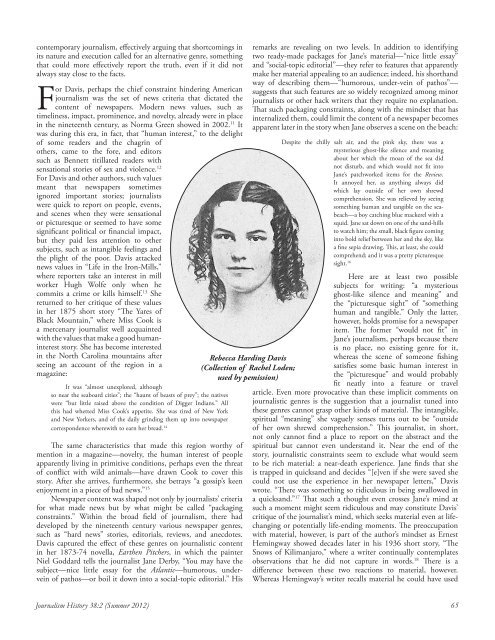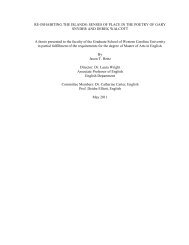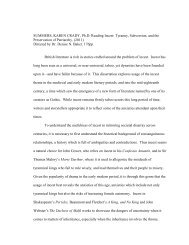Stories of Today: Rebecca Harding Davis' Investigative Fiction
Stories of Today: Rebecca Harding Davis' Investigative Fiction
Stories of Today: Rebecca Harding Davis' Investigative Fiction
You also want an ePaper? Increase the reach of your titles
YUMPU automatically turns print PDFs into web optimized ePapers that Google loves.
contemporary journalism, effectively arguing that shortcomings in<br />
its nature and execution called for an alternative genre, something<br />
that could more effectively report the truth, even if it did not<br />
always stay close to the facts.<br />
For Davis, perhaps the chief constraint hindering American<br />
journalism was the set <strong>of</strong> news criteria that dictated the<br />
content <strong>of</strong> newspapers. Modern news values, such as<br />
timeliness, impact, prominence, and novelty, already were in place<br />
in the nineteenth century, as Norma Green showed in 2002. 11 It<br />
was during this era, in fact, that “human interest,” to the delight<br />
<strong>of</strong> some readers and the chagrin <strong>of</strong><br />
others, came to the fore, and editors<br />
such as Bennett titillated readers with<br />
sensational stories <strong>of</strong> sex and violence. 12<br />
For Davis and other authors, such values<br />
meant that newspapers sometimes<br />
ignored important stories; journalists<br />
were quick to report on people, events,<br />
and scenes when they were sensational<br />
or picturesque or seemed to have some<br />
significant political or financial impact,<br />
but they paid less attention to other<br />
subjects, such as intangible feelings and<br />
the plight <strong>of</strong> the poor. Davis attacked<br />
news values in “Life in the Iron-Mills,”<br />
where reporters take an interest in mill<br />
worker Hugh Wolfe only when he<br />
commits a crime or kills himself. 13 She<br />
returned to her critique <strong>of</strong> these values<br />
in her 1875 short story “The Yares <strong>of</strong><br />
Black Mountain,” where Miss Cook is<br />
a mercenary journalist well acquainted<br />
with the values that make a good humaninterest<br />
story. She has become interested<br />
in the North Carolina mountains after<br />
seeing an account <strong>of</strong> the region in a<br />
magazine:<br />
It was “almost unexplored, although<br />
so near the seaboard cities”; the “haunt <strong>of</strong> beasts <strong>of</strong> prey”; the natives<br />
were “but little raised above the condition <strong>of</strong> Digger Indians.” All<br />
this had whetted Miss Cook’s appetite. She was tired <strong>of</strong> New York<br />
and New Yorkers, and <strong>of</strong> the daily grinding them up into newspaper<br />
correspondence wherewith to earn her bread. 14<br />
The same characteristics that made this region worthy <strong>of</strong><br />
mention in a magazine—novelty, the human interest <strong>of</strong> people<br />
apparently living in primitive conditions, perhaps even the threat<br />
<strong>of</strong> conflict with wild animals—have drawn Cook to cover this<br />
story. After she arrives, furthermore, she betrays “a gossip’s keen<br />
enjoyment in a piece <strong>of</strong> bad news.” 15<br />
Newspaper content was shaped not only by journalists’ criteria<br />
for what made news but by what might be called “packaging<br />
constraints.” Within the broad field <strong>of</strong> journalism, there had<br />
developed by the nineteenth century various newspaper genres,<br />
such as “hard news” stories, editorials, reviews, and anecdotes.<br />
Davis captured the effect <strong>of</strong> these genres on journalistic content<br />
in her 1873-74 novella, Earthen Pitchers, in which the painter<br />
Niel Goddard tells the journalist Jane Derby, “You may have the<br />
subject—nice little essay for the Atlantic—humorous, undervein<br />
<strong>of</strong> pathos—or boil it down into a social-topic editorial.” His<br />
<strong>Rebecca</strong> <strong>Harding</strong> Davis<br />
(Collection <strong>of</strong> Rachel Loden;<br />
used by pemission)<br />
remarks are revealing on two levels. In addition to identifying<br />
two ready-made packages for Jane’s material—“nice little essay”<br />
and “social-topic editorial”—they refer to features that apparently<br />
make her material appealing to an audience; indeed, his shorthand<br />
way <strong>of</strong> describing them—“humorous, under-vein <strong>of</strong> pathos”—<br />
suggests that such features are so widely recognized among minor<br />
journalists or other hack writers that they require no explanation.<br />
That such packaging constraints, along with the mindset that has<br />
internalized them, could limit the content <strong>of</strong> a newspaper becomes<br />
apparent later in the story when Jane observes a scene on the beach:<br />
Despite the chilly salt air, and the pink sky, there was a<br />
mysterious ghost-like silence and meaning<br />
about her which the moan <strong>of</strong> the sea did<br />
not disturb, and which would not fit into<br />
Jane’s patchworked items for the Review.<br />
It annoyed her, as anything always did<br />
which lay outside <strong>of</strong> her own shrewd<br />
comprehension. She was relieved by seeing<br />
something human and tangible on the seabeach—a<br />
boy catching blue mackerel with a<br />
squid. Jane sat down on one <strong>of</strong> the sand-hills<br />
to watch him; the small, black figure coming<br />
into bold relief between her and the sky, like<br />
a fine sepia drawing. This, at least, she could<br />
comprehend; and it was a pretty picturesque<br />
sight. 16 Here are at least two possible<br />
subjects for writing: “a mysterious<br />
ghost-like silence and meaning” and<br />
the “picturesque sight” <strong>of</strong> “something<br />
human and tangible.” Only the latter,<br />
however, holds promise for a newspaper<br />
item. The former “would not fit” in<br />
Jane’s journalism, perhaps because there<br />
is no place, no existing genre for it,<br />
whereas the scene <strong>of</strong> someone fishing<br />
satisfies some basic human interest in<br />
the “picturesque” and would probably<br />
fit neatly into a feature or travel<br />
article. Even more provocative than these implicit comments on<br />
journalistic genres is the suggestion that a journalist tuned into<br />
these genres cannot grasp other kinds <strong>of</strong> material. The intangible,<br />
spiritual “meaning” she vaguely senses turns out to be “outside<br />
<strong>of</strong> her own shrewd comprehension.” This journalist, in short,<br />
not only cannot find a place to report on the abstract and the<br />
spiritual but cannot even understand it. Near the end <strong>of</strong> the<br />
story, journalistic constraints seem to exclude what would seem<br />
to be rich material: a near-death experience. Jane finds that she<br />
is trapped in quicksand and decides “[e]ven if she were saved she<br />
could not use the experience in her newspaper letters,” Davis<br />
wrote. “There was something so ridiculous in being swallowed in<br />
a quicksand.” 17 That such a thought even crosses Jane’s mind at<br />
such a moment might seem ridiculous and may constitute Davis’<br />
critique <strong>of</strong> the journalist’s mind, which seeks material even at lifechanging<br />
or potentially life-ending moments. The preoccupation<br />
with material, however, is part <strong>of</strong> the author’s mindset as Ernest<br />
Hemingway showed decades later in his 1936 short story, “The<br />
Snows <strong>of</strong> Kilimanjaro,” where a writer continually contemplates<br />
observations that he did not capture in words. 18 There is a<br />
difference between these two reactions to material, however.<br />
Whereas Hemingway’s writer recalls material he could have used<br />
Journalism History 38:2 (Summer 2012)<br />
65
















